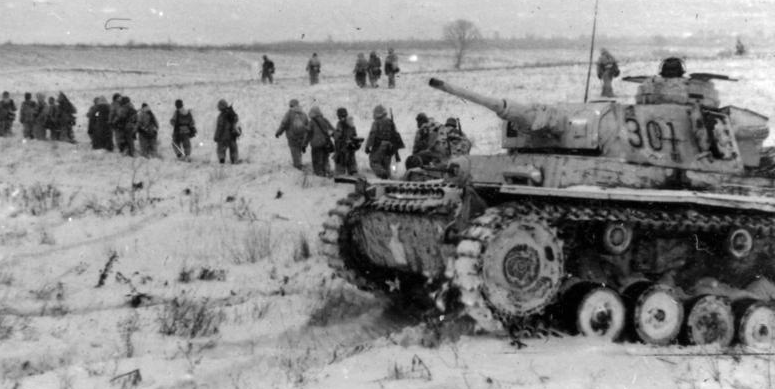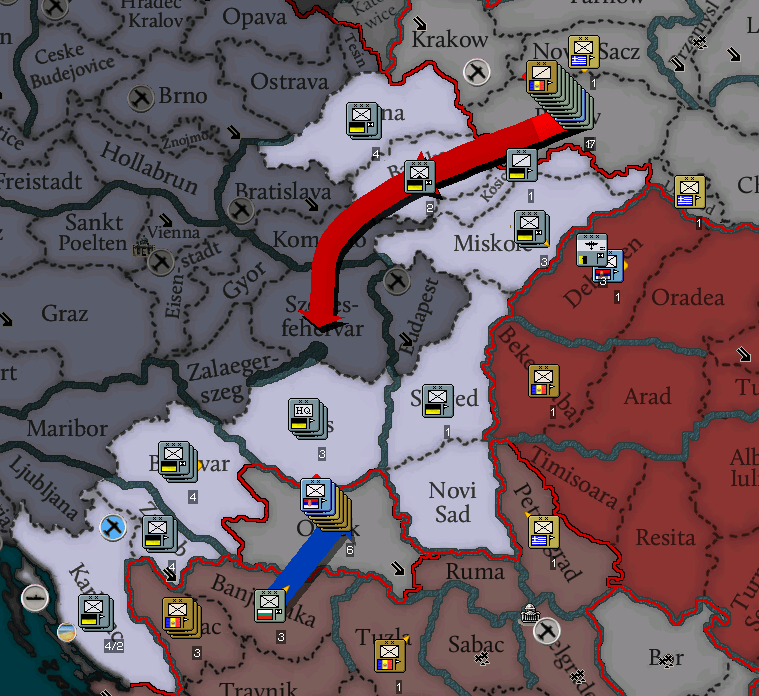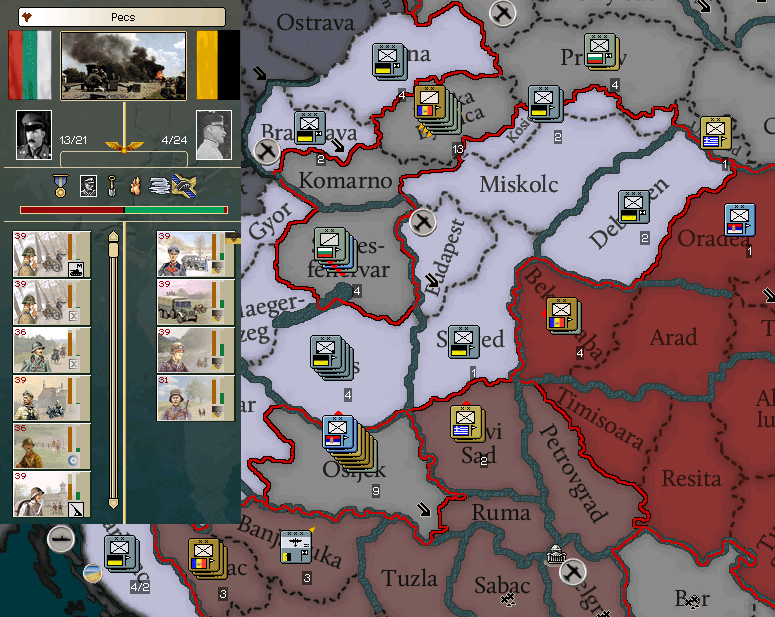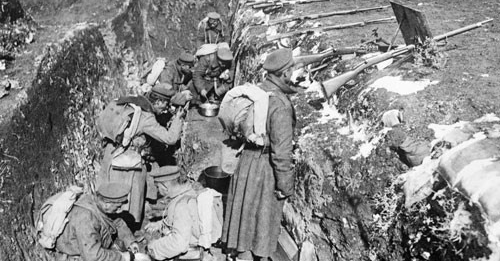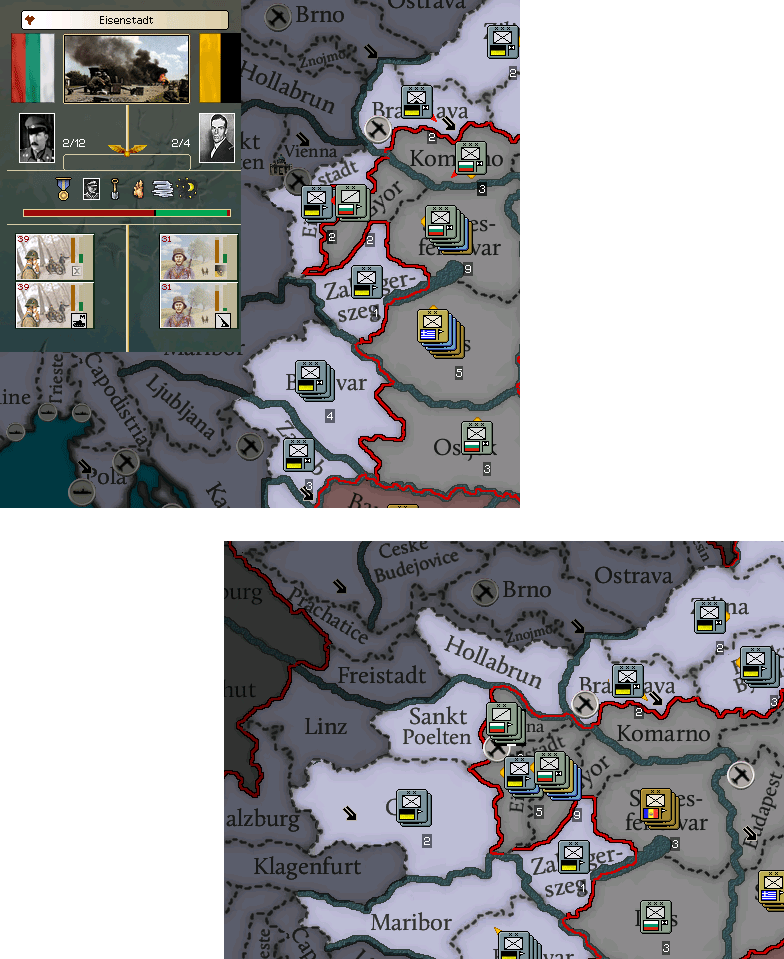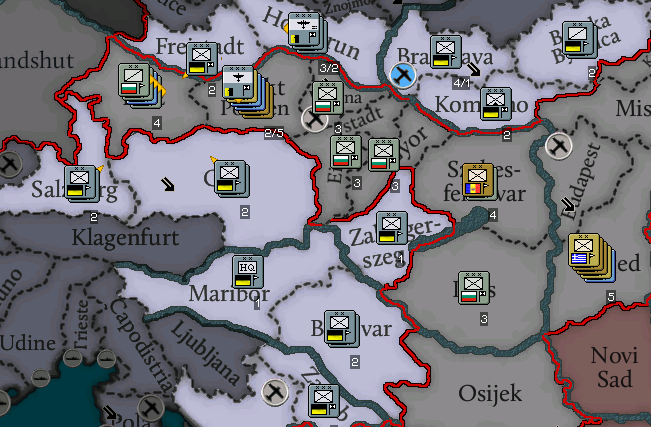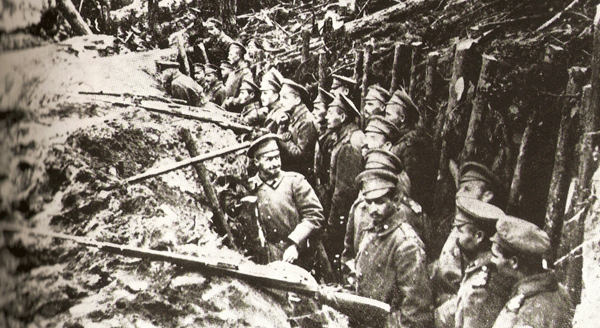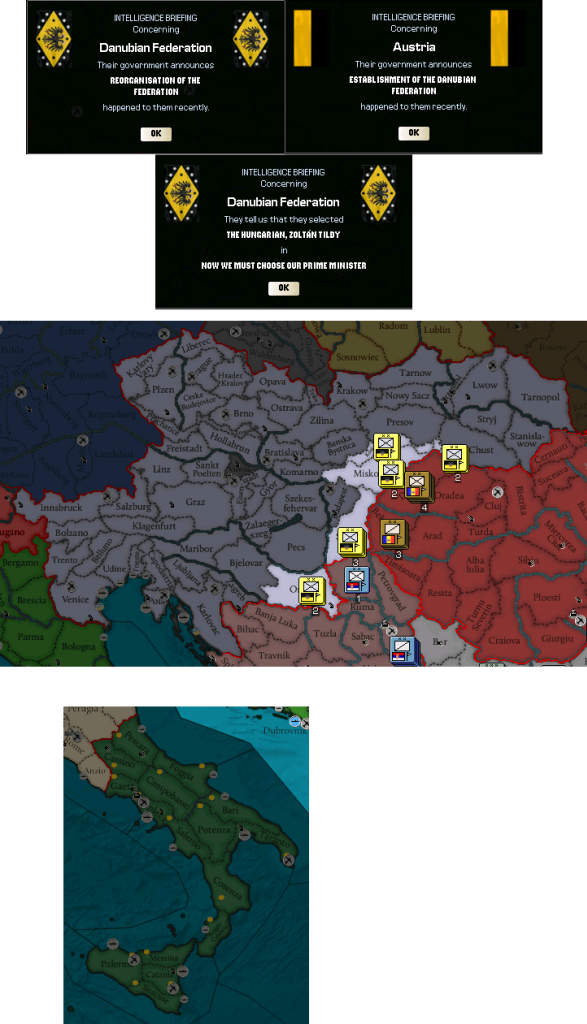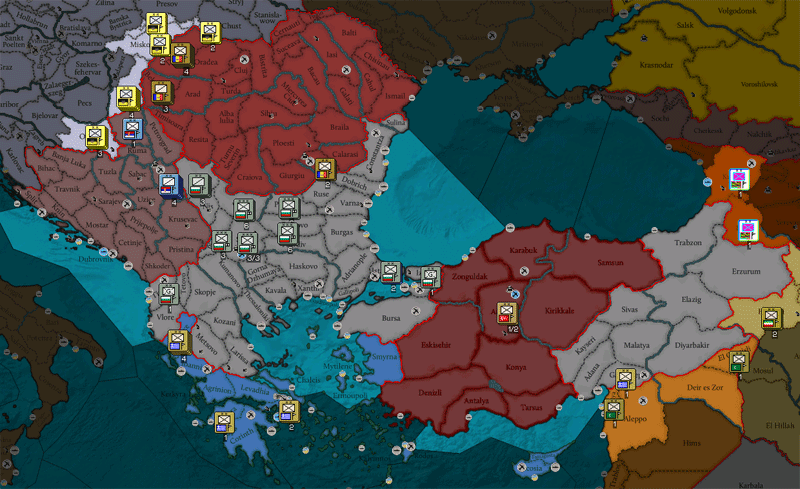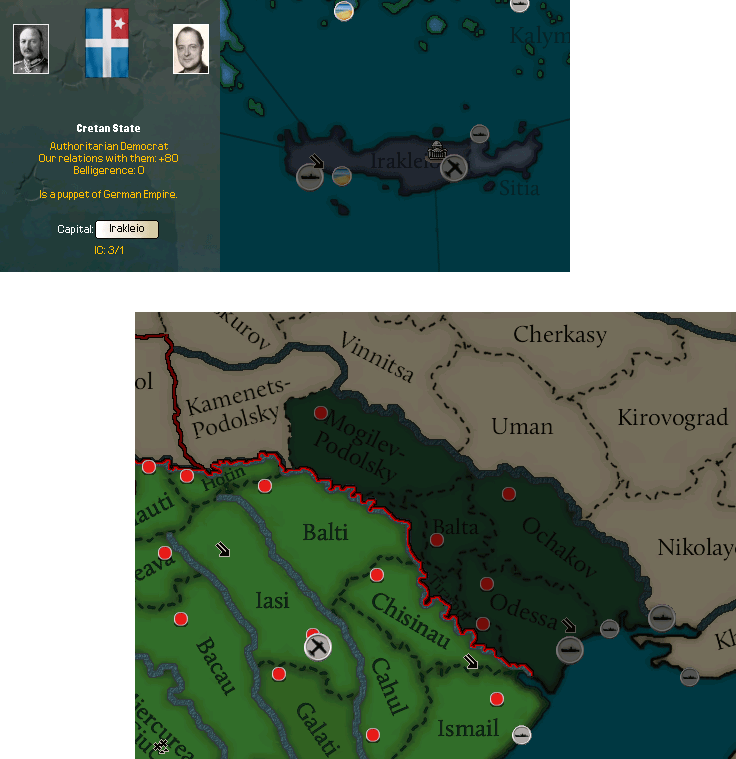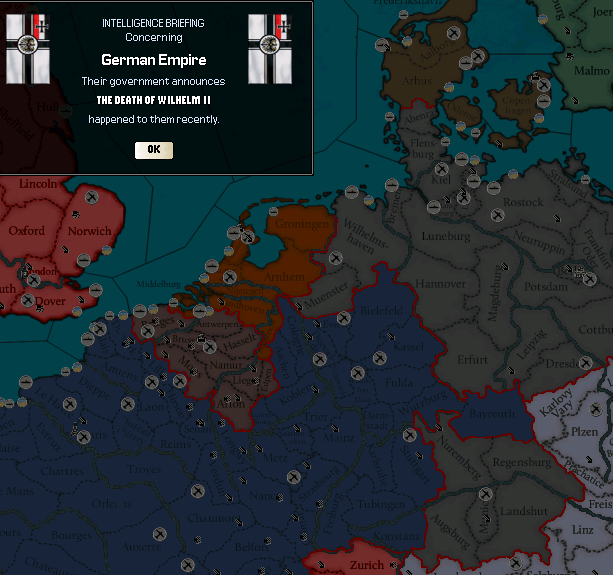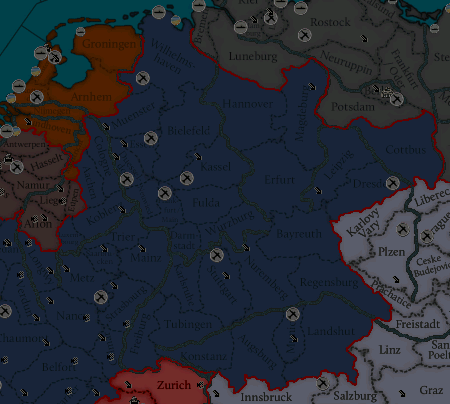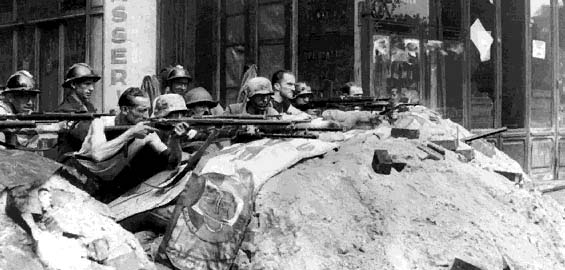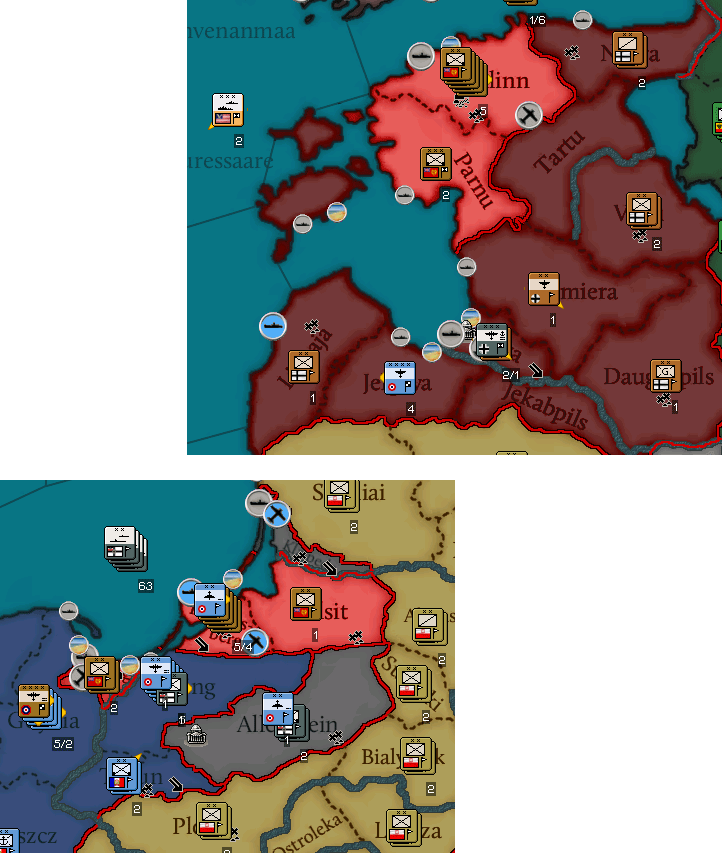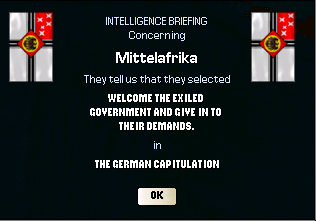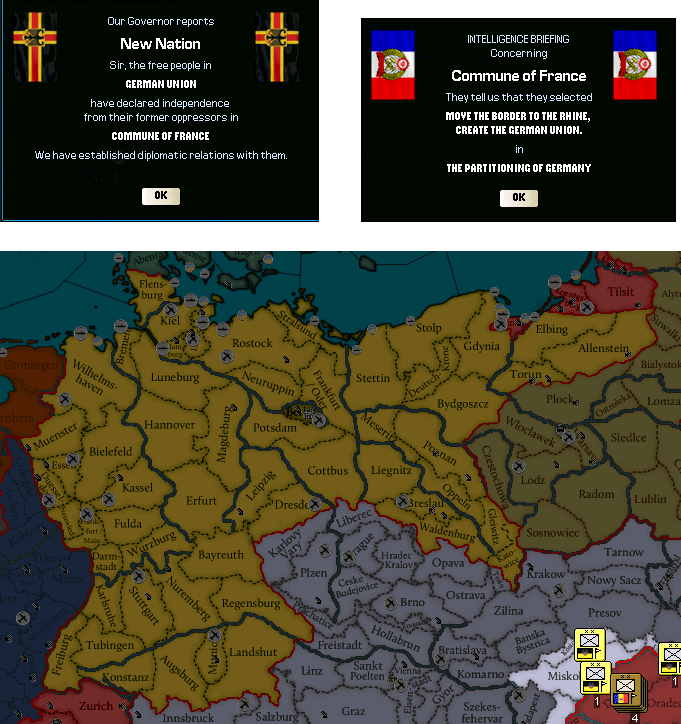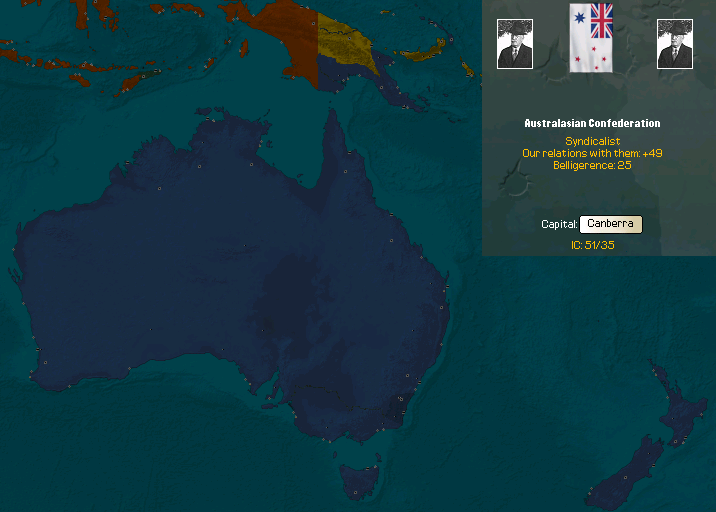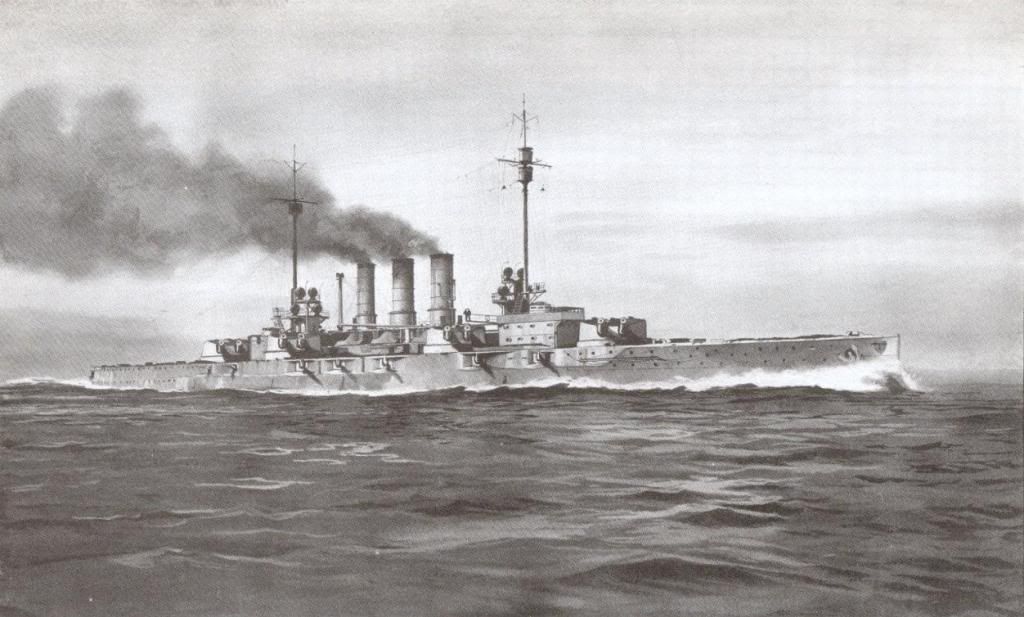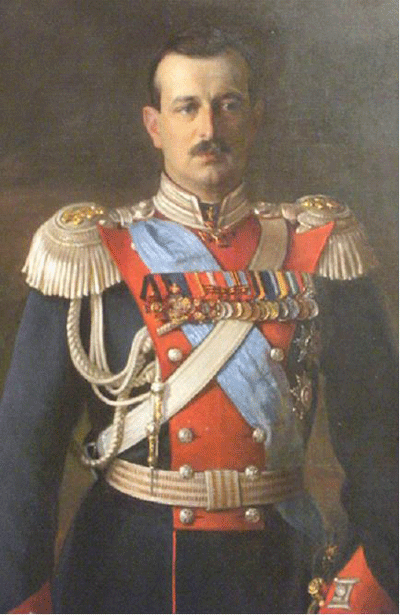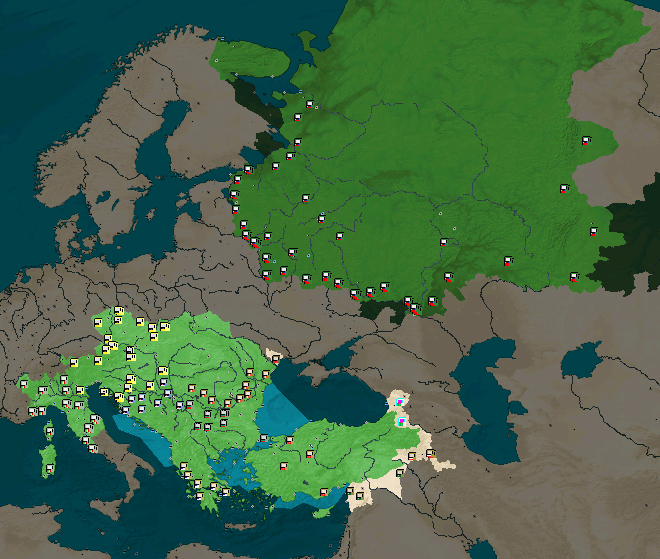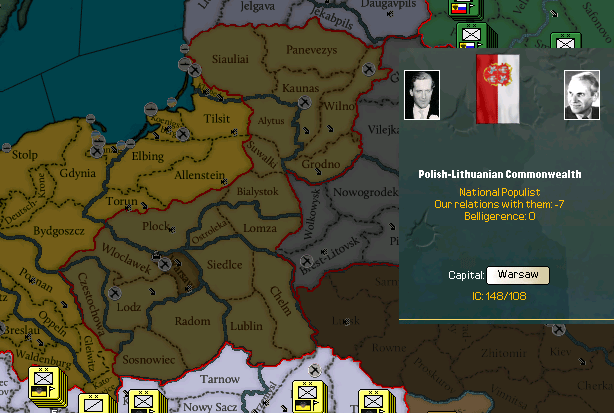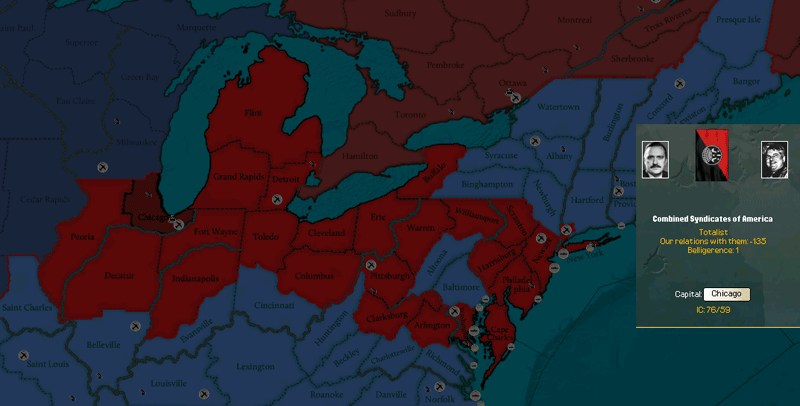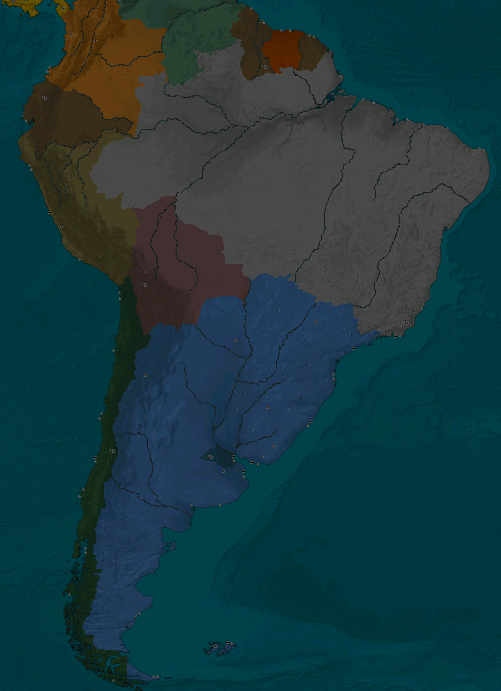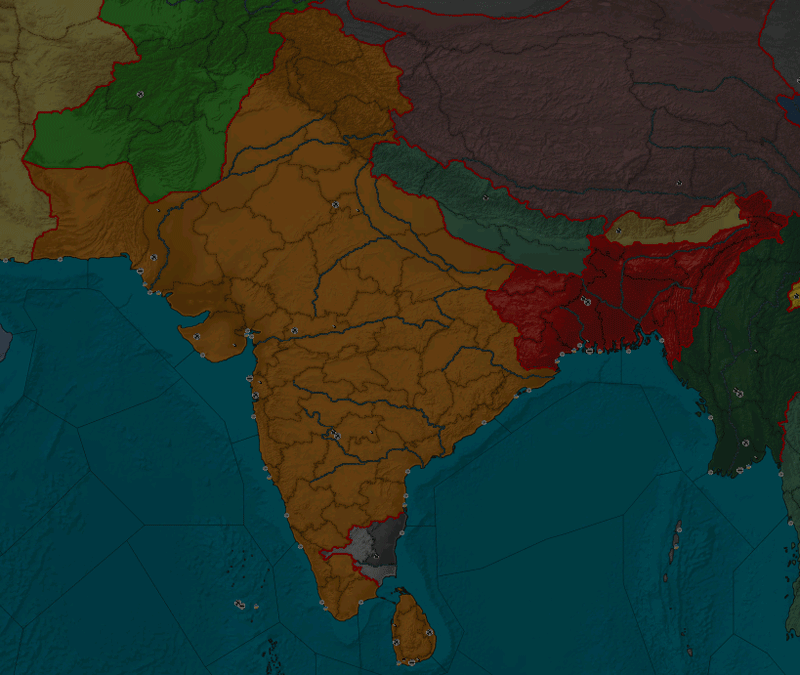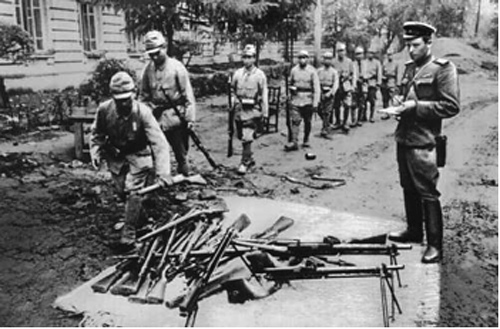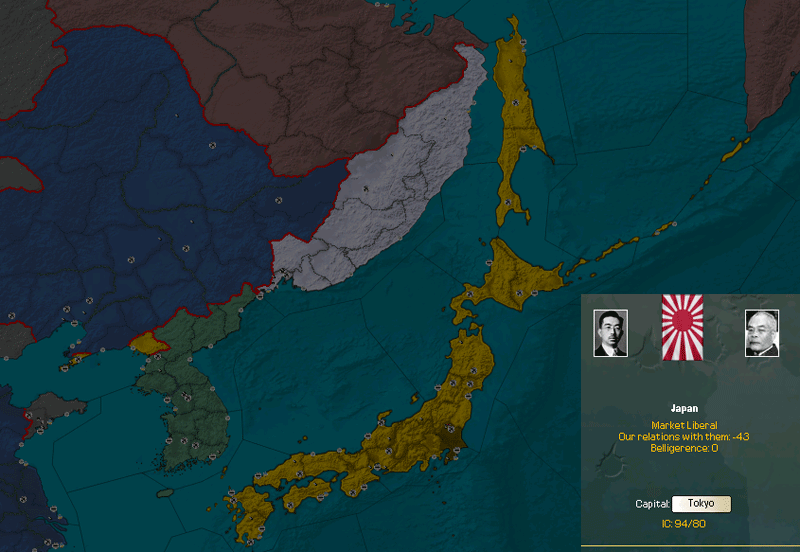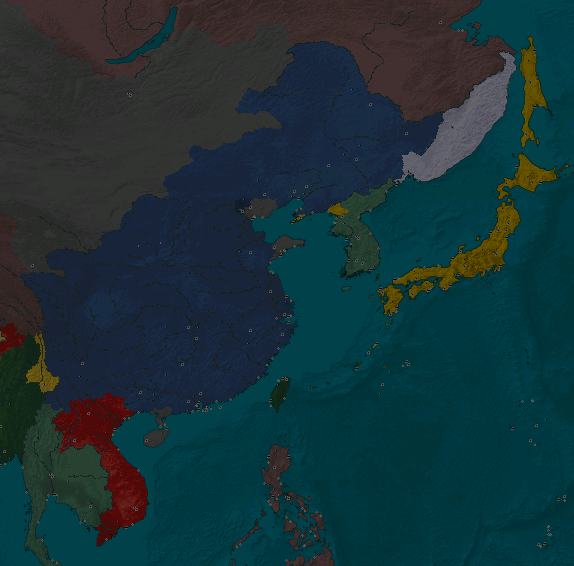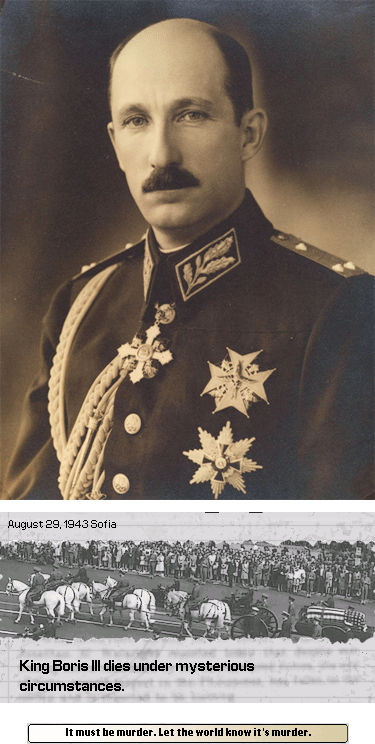-------------------------------------------------------------------------
------------------------------------------------
~ State of the World ~
Dominions of the British Empire
The British-Canadians have passed the moment to declare war when the Syndicalists and Mitteleuropa clashed. After the war, Britain became an unassailable island fortress, backed by its powerful continental allies. The victory against Germany means that France can ease its focus on Central Europe and can afford to defeat any Entente assault on Red Europa. During the reigning years of Tsar Boris, the declining British Empire continues to decline. The final loss of India to the Bharitya Commune and to the Princely Federation as the two rival Indian states crushed the Princedom of Delhi.
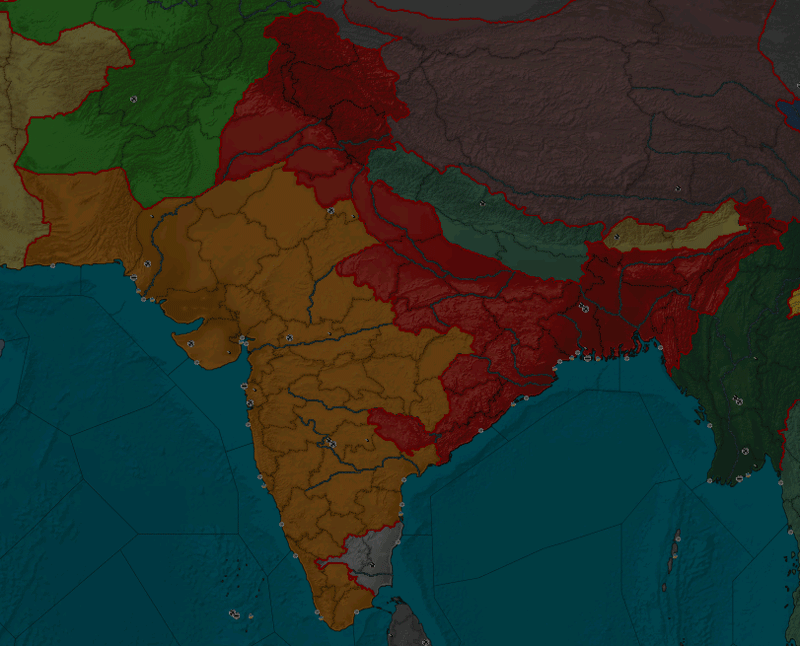
Down under, the Australasian Confederation was rocked with dissent, political infighting, and instability. The Syndicalists were the first to sense its weakness, and took the opportunity. Financed by French, British, and Indian agents, the revolt succeeded when Canberra and other major cities were captured by the rebels. Many army units took the Syndicalist's side, making the odds favourable to the Reds. The Confederation under a new government and a new ideology left the Entente and joined the Internationale.
Canada and the Caribbean Federation is all that's left of the once vast empire. It is still unclear whether the Canadian navy is enough to stand toe-to-toe against the combined French and British fleets and clear a way for the liberation of their homeland. With the victory against Germany, this chance seems bleak.
Nationalist France
The junior partner of the Entente that became more reliant on their British-Canadian peers after the fall of France, sending aid and signing agreements such as subsidised trade and sending technical experts to Algeria. To counter the Syndicalist threat, they have expanded the navy as proposed by Admiral Darlan. Three heavy cruisers and fifteen destroyers were added to the obsolete weltkrieg-era armada. However, these new warships turn out to be worthless.
National France doesn't have the resources nor the dockyards capable of replacing its antique navy
Ottawa didn't blow the horns of war when the Syndicalists and the Germans clashed at the Rhineland. The French leadership was frustrated on keeping themselves at their side of the Med Sea, and any solo campaigns to the mainland would be suicidal with their current numbers and the supremacy of the Red fleets in the Atlantic and the Med Sea. After the war against the Germans, the Syndicalists held a conference to spark nationalist uprising into the dark continent. The French minority in Africa were struck hard by the sponsored revolts throughout the country. In Dakar, Guinea, and Mali, revolts have flared. It was the Algerians, however, that made the biggest impression. Algerian revolutionaries have seized the city of Oran and other places. Even though the rebels were defeated, the Algerian Revolution lasted for two weeks. The rebels were wiped out but the damage was already done. A dented economy and a significant number of emigrates left the country to return back to mainland France or to North America. The fledging exiled state now struggles to get back on its feet.
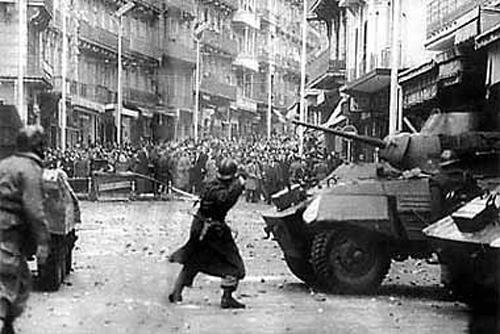
Algerian nationalists nearly placed National France into extinction
The League of the Three Emperors
A 20th Century version of Bismarck's alliance, but with a different purpose and composition. The fall of Germany, and the encroaching Syndicalists from the west into the borders of the three empires have driven the rest of White Europa into panic. The new Danubian Federation desperately scouted for a new ally (who aren't Bulgarians) and found it in St. Petersburg.
The old Russian empire silently licks its wounds through the Syndicalist-Mitteleuropa War. Wounds it has inflicted upon by the Brest-Litovsk Treaty, the Black Monday, and the two bloody civil wars. The aftermath of the second civil war, which lasted for two years, was too much for the ancient empire. Karelia was lost to Finland, Siberia revolted and found safety under Japanese protection, and the homeland was wrecked under the fires of conflict and collapsed under widespread poverty. The only consolation the Romanovs got was their return during the 2nd civil war when the Patriarch failed on his test of leadership. He was unceremoniously ousted to make way for Kyril Romanov. The second consolations was that the Bolsheviks were utterly destroyed and discredited under the resurgent authoritarian regime of the Romanovs.
Kyril's coronation marks the return of the Romanovs in Russia
after the horrors and instability of the republican period
The new Romanov Empire rebuilt itself as the Syndicalists crept slowly into Russia's borders. After the war, the new tsar, Vladimir Romanov [fun fact: his official title is Imperator too, like Bulgaria] had enough of these revolutionaries and accepted Vienna's offer. The SPB-Vienna alliance was the first step forward on the crusade against Syndicalism.
Not content with battered Danubia, Russia also extended the alliance with Sofia, regardless of strong objections from the Danubians. To compensate for that, the Russians did impose two conditions with the Bulgarians; Debrecen and Bekerscsaba must be returned to the Danubian Federation, and a treaty to allow Russian naval ships free passage through the straits, both peacetime and wartime. The Bulgarians accepted. It was a small price to pay for all the benefits they got: recognition of Bulgarian Imperator and the hold of Tsarigrad (something the Russians desired), the claims on South Italy and Besserabia, and the Armenian claims on Transcaucasia.
The "League" came into maturity with the inclusion of the client states of the two empires; (provisional) Armenia, and the Italian Federation. The only notable exceptions were Finland, Spain, and the Polish-Lithuanian Commonwealth. The first is desired by Russia, and have signed a non-aggression pact and a defensive treaty with the Scandinavians. Spain was reluctant as she is alone in the west. The last was barred from entering as they refused to relinquish their claims on Galicia-Lodomeria; not to mention, Russia wants to regain to its pre-weltkrieg borders once again.
Members of the Three Emperors' League:
- Russian Empire
- Danubian Federation
- Italian Federation
- Bulgarian Empire
- Kingdom of Armenia
European Syndicalists
The Socialist Revolution reached to new heights after the fall of mighty Germany. The revolution had first reached its ripeness in Scandinavia when Norway and Sweden, under pressure from the disgruntled working class, elected Socialist parties. These new governments enacted leftist policies that took the attention of Berlin. Concerned that a German invasion is coming, the two countries agreed to unify under the Treaty of Halden – a town near the Norwegian-Swedish border - to unify themselves into the Scandinavian Federation.
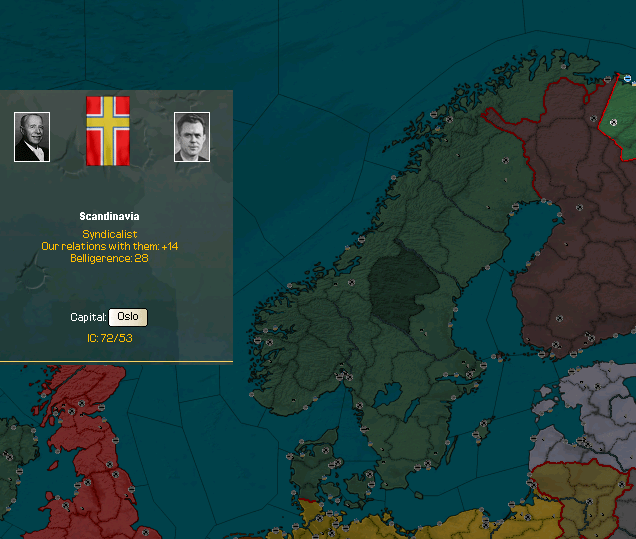
The revolution in Spain have failed with the Royalists of Madrid being the winner of the conflict. The victory of the Syndicalists and the destructive civil war have pushed Spain into isolation and constant worrying. The French could now focus on their country without a powerful Germany to back them up – the exiled government in Goringsburg won't suffice. However, there are those who wants to turn to the League for protection, but allying themselves with them means that the French would open a new front towards Spain, and there will be no one, except perhaps Portugal, to help to their defences.
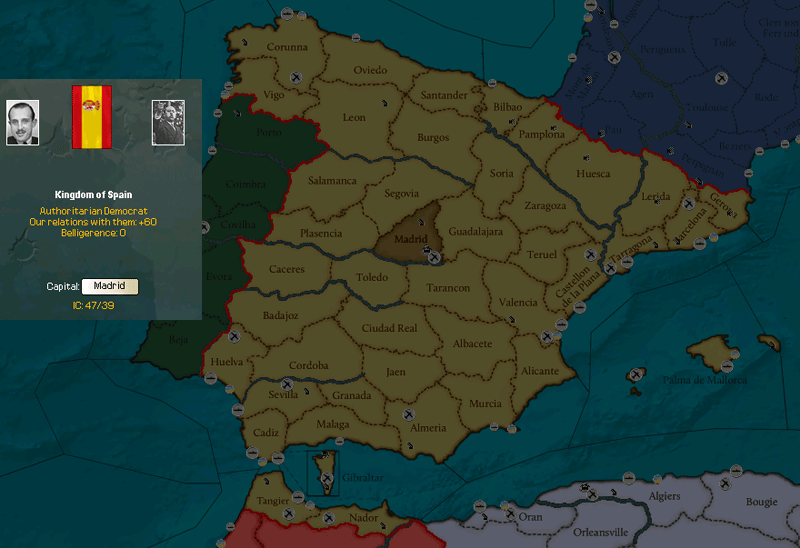
After the war against Germany, Britain went on to more foreign adventures such as the invasion of Morocco, Crete, and Malta. The French took the Rhine River as its border with Germany. Belgium was resurrected, though there are some who wants it to be annexed whole to the Commune. Scandinavia took Denmark, and they were promised that Holstein will be given to them. The Baltic Socialist Union and the Commune of Ruthenia were created. In response to the Three Emperors' League, the Eastern European Socialists; the Ukrainians, the Caucasians, and the Cossacks have joined the alliance with the westerners, provided that their Totalist interpretations would be tolerated by Paris and London. Some Anarchists in the CGT were uncomfortable at allowing these heretics into the alliance, but they were overwhelmed by the more practical moderates. Ukraine, still under Khrushchev dropped its isolationist policy and become the first among the Totalists to join. The Berian Cossacks and Caucasians followed suit.
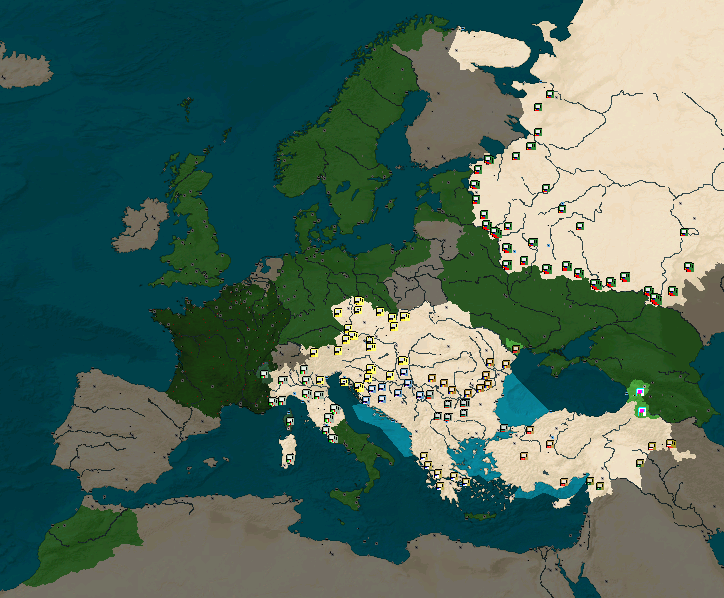
Members of the European section of the Internationale:
- Commune of France
- Union of Britain
- Socialist Republic of Italy
- Federation of Scandinavia
- Commune of Belgium
- Commune of Luxembourg
- Socialist Union of Germany
- Baltic Socialist Union
- Commune of Ruthenia
- Ukrainian Soviet Socialist Republic
- Don-Kuban People's Republic
- Transcaucasian Democratic Federative Republic
The borders between the two camps were drawn. The final attempts to change those were the addition of Switzerland into the League and the planned invasion of the PLC by Paris. The first saw some progress when the negotiations between Vienna and Bern to include Switzerland into the League have ended with agreement on both sides. So far, it was only negotiations. Soon, the Swiss delegations will meet with their Russian counterparts.
The Syndicalists have also planned an invasion of the Polish-Lithuanian Commonwealth to link up with the eastern states bordering the now dangerous and resurgent Russia. Predictably, the Three Emperors guaranteed the independence of the PLC – the Commonwealth is still barred from joining the League though. The stand-off at PLC was one of the moments were Europe nearly descended to war once again. On both sides, this worrying sensation hung in the air breeding fear and insecurity to everyone.
The Americas
In the New World, the Unionists, who wants a corporatist unitary state, have won the war that have killed so many Americans and destroyed livelihoods more than their previous wars combined. The Syndicalists were the first to fall as they were sandwiched between the Federalists and the Unionists. Chicago fell in the 17th of May 1940, and destroyed CSA's capacity to continue the war. The Reds made their last stand in Detroit against the assaulting Unionists.
The master of the eastern half of the United States became too powerful for the Federalists to resist, whom have also lost the eastern coasts to the PSA. After the fall of the legitimate government, the Californians weren't spared. The Unionists soon have mostly unified the country, and restructured it into a unitary state; all the states were destroyed and power is centralised to the central government now located in Atlanta. All that remains for them to do is the retaking of the territories Mexico took during the war.
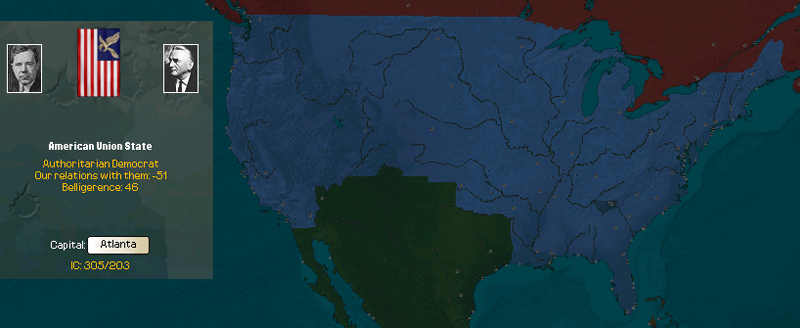
Mexico have experienced a coup d'etat after the death of President Zapata. A military triumvirate under General Calles, General Corona, and General Olachea overthrew the government, banned the political parties, and ended Mexican democracy. The junta then exploited the civil war in the US and took Texas, Arizona, and New Mexico. Mexico now has to find a way to save themselves; either prevent the Americans from attacking through alliances and diplomacy, or surrender the lands without a fight. However, Mexico seem to put its head into the sands, hoping that the Americans would forgive and forget.
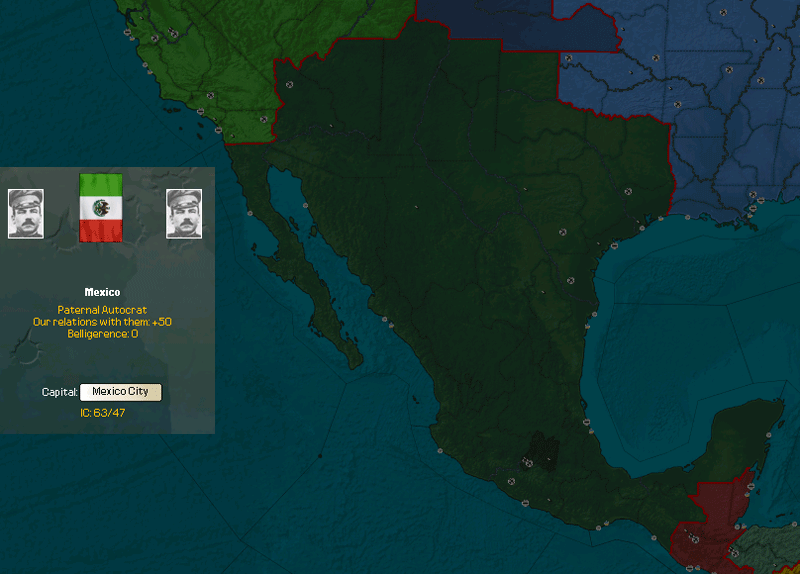
In the south in the year 1940, a border skirmish nearly place La Plata and Brazil into war, however, the latter conceded by paying compensation as demanded by Buenos Aires. Peace didn't reign that long. Another skirmish occurred the next year in the frontiers near the Uruguayan border, this time no side backed down – La Plata declared war against Brazil in the 10th of February 1941. By February 1943, two years into the conflict, Brazil is losing against the Platineans. Syndicalism is in decline in South America, only committed intervention from the Red Europeans can reverse this trend.
India
The chaos in India began in January 1939, when the Princedom of Delhi, confident on its own strength and the backing of the Entente, have declared war on the Bharitya Commune. This is a drastic response when they learnt about the Indochinese victory against the Germans. The pro-Entente Indians feared that the fall of Vietnam would result in, what the British policy-makers in Delhi call it as, the “Domino Theory”. The fall of Vietnam would start a momentum that would make the states of South East Asia collapse one by one under Syndicalism - like dominos. Delhi, thus, saw it as imperative to eliminate the lynch-pin of Syndicalism in Asia - the Bharitya Commune. The declaration of war instantly backfired. The Princely Federation saw Delhi as more dangerous than Bharitya. So, the princes of the south have declared war against Delhi. To make matters worse for the Entente, the victorious Turkmen from Central Asia want to bring Persia and India under their so-called Caliphate, and sent their horsemen across onto the Persian and Afghan lands.
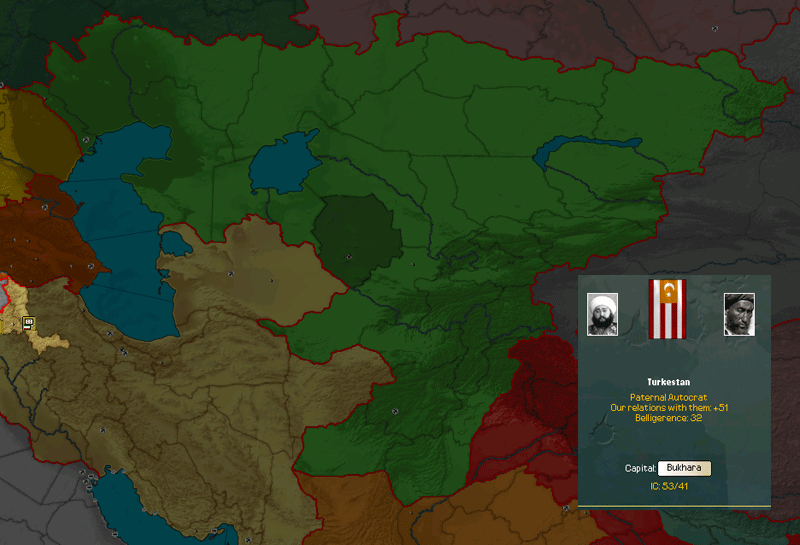
Delhi against Turkestan, Bharitya, and the Princely Federation stood no chance, even backed by Entente airpower and some expeditionary troops from Australasia. In February 1940, barely a year into the war, Delhi was carved between the competing forces of the Princes and the Syndicalists. Shortly afterwards, the two winners turned to each other. The Syndicalists financed and armed working class revolts in the federation lands. The armies of the Princes crushed all revolts within a month. The Princes took no rest that when the smoke have cleared, they immediately marched into the Commune in April 1940.
India. May 1940
Three years went pass and the Princes are winning against the Syndicalists. A significant portion of the Bharityan army was sealed off and destroyed in Kashmir and the Himalayas. By August 1943, the Princely Federation controls most of the subcontinent. Only the Bharityan home base was the only thing that remains. It should also be noted that Sri Lanka was taken from the Germans during their fall.
Empire of Japan
One of Japan's goals was its ascension into the realm of the Great Powers and attain an empire of its own: to be one of the dominant force in world politics. In order to achieve that, Japan argued that it must be the “Britain of Asia”: a proud island nation that controls an oversea empire within the Greater East Asia (East Asia + SE Asia). Its early steps were the conquest of Korea, and the submission of Kolchak's Transamur and the Fengtien clique. It managed to bring Siberia under its fold too, quite luckily for them, when another Russian civil war have flared. The next step was the conquest of China and the elimination of the German presence in the region. However, it wasn't meant to be.
The Japanese overlordship of its non-Japanese subjects was harsh and brutal. Because of that, the Korean uprising in May 1937 have started a chain reaction that led to the premature downfall of the empire. The vassal nations, at first, joined Tokyo on defeating the Korean rebels, but when the Formosan rebelled too and allied with the Koreans, the others took a double take. Fengtien and Transamur turned their coats. Only Siberia left in Japan's side, but it is too weak that Transamur alone can match them.
Japanese soldiers lay down their arms in front of a Transamurian officer
Just a month after the Korean revolution, the Japanese military was humiliated with the surrender of the last Japanese forces in Busan. Formosa too was free from Japanese control. Many Japanese prisoners preferred 'seppuku', something their captors allowed, than to return to the home islands. The remaining generals were disgraced and became highly unpopular in the homelands. The fall of the military and the militarists gave way to the return of democracy, something that the Emperor have publicly endorsed. The Liberal Party won in the new election, promising economic prosperity, reduction of unemployment and a more humble foreign policy. The promises sold well to the Japanese public. The Liberals won.
The fate of the subordinate countries differs. The Fengtien Clique have submitted to the Qing Emperor in exchange for a position in the empire. Transamur and Formosa chose to remain under Japanese fold due to the fear of the resurgent Qing Empire. Korea defiantly chose independence, hoping that neutrality or playing the two dominant power against each other would preserve its sovereignty. The Japanese project of dominating Asia turned out to be a flop.
The “Empire” is now heavily dependent on Vladivostok for access to Transamur and Siberia
Qing Empire
Perhaps it was inevitable that the Chinese state would arise from the ashes and become one of the great powers. Though during the 1930s, many never had that thought. The Qing Dragon experienced a quiet but rapid industrialisation under the supervision of Wang Kemin – a banker and an industrialist. It is a cultural thing in Confucian China that merchants are in the lowest rungs of society, but Wang Kemin has an aura and prose of a civil servant. He fit quite well within the Imperial bureaucracy and jumpstart his very ambitious '5 Year Plan'. He famously said “[China] is 50 years behind the advanced countries. We must close that gap within 5 years or we will be perished from this world.”
While the empire industrialised with neck-breaking speed, the Qing have sent extensive military aid to the anti-Japanese alliance, with all the hope that it would kick Japanese influence out of the mainland. The investment bear fruit. Soon, the vassals of Japan all turned against her except Siberia. Its enemies unified and they were kicked out of the mainland. The Japanese sought peace. The Fengtien Clique submitted to the Dragon Throne, betting that Beijing would be a better master. Korea went to full independence and strive for neutrality. However, Transamur, Formosa, and Siberia remains under the protection of Japan.
Seeing that the northern flank is secured and Japan humbled, the Qing turned to the millennial cultists in the mountains of Shanxi on August 1937. They have annihilated the millennials on January 1938. The war ended with Germany requesting to share the conquered land with the AOG. The loss was temporary though. The Qing Emperor flexed his muscles once again and demanded the return of actual control of the southern lands back to Beijing. The AOG submitted to the emperor without a fight. Germany asked for a favourable trade agreement with the Qing as compensation. Beijing accepts the request.
Qing then sets its eyes to the Legation cities and Macao. The Legation cities thought that the great powers would protect them, but the expectations fell flat. No great power, not even Japan stood up for the treaty cities. They submitted to the Qing Emperor. The Portuguese also gave up Macao without a fight. Washed by confidence, the Qing then forced a stand-off with the Yunnan warlords, but this time, they faced resistance. The warlord state struck first. It may seem utter foolish to do that, seeing how the warlord armies suffered defeats during initial phase of the war, but as the Qing soldiers dive in deep into enemy territory, the Qing armies suffered huge casualties. Five years on, and the mighty Qing Empire fails to fully pacify the region. The Yunnan warlords are still hanging on, in the mountains of the borderlands.
------------------------------------------------
The Death of Imperator Boris Veliki
It was the 27th of August when the Imperator visited Gaziantep, Armenia. The meeting with the Armenian king and his government went well. But when the imperial delegation returned to Sofia, the Imperator's time was running out. He suffered a heart failure on the 28th. The fact was kept under cover from the public as the doctors worked throughout the night. On the 29th of August 1943, 11:34 AM – Eastern European Time – Imperator Boris III of House Saxe-Coburg and Gotha was pronounced dead. The people were stunned and frozen in their places when the state announcement was given. People started to cry as the report goes on.
How could a strong and healthy warrior-king died of a heart failure at the age of 49? The DS (state security) and the imperial physicians found no answer to that question. The DS found themselves under attack when an MP accused them of criminal incompetence on the following assembly, and even suggested that the Emperor was poisoned: “it is the only logical conclusion” he argued in the National Assembly. He received some jeers but some nodded.
The Armenian state security then announced to the world that they have apprehended the “assassin” responsible for poisoning the Emperor and spoke the truth under their questioning. The assassin was an Armenian Socialist named Tigran, who works as an agent for the Transcaucasian Federation. This latest revelation shook the empire, and all of Europe. The Bulgarian DS was humiliated and the empire's press all rally up the people into a Jingoistic frenzy. To war! They said. Bulgarians, Rumanians, Serbians, and Greeks; all unified with one voice: to war!
A boy, Simeon II, became the new ruler of the empire – Imperator of the Roman Empire, Tsar of Bulgaria, Tsar of Rumania, Tsar of Serbia, Tsar of Greece, and Tsar of Anatolia. His uncle, Kiril, was appointed as the regent because of the emperor's young age. The regent and the government soon found themselves riding the tide of Jingoism. “Fight the Reds!” was the call of the Bulgarian empire. All of Europe trembled. Mars descends to the old continent once again.
End of AAR
------------------------------------------------
-------------------------------------------------------------------------
So, this ends the short AAR. I fully expected that Germany would win, so that's why I decided to cut from the point when I invaded South Italy, Georgia, and Ukraine but that didn't happened.
It would also be a challenging game if I continue but I'm blank on what's gonna happen next.
I'm going next with another short AAR: KR Kurdistan. Of course, you're free to suggest any country.


